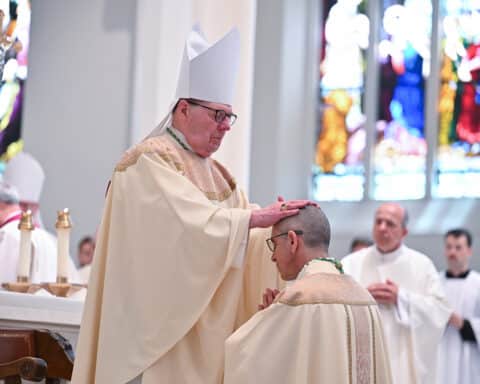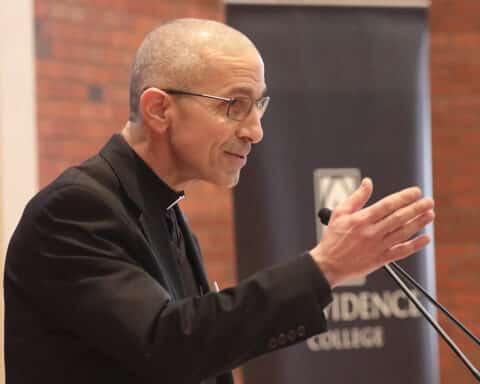WASHINGTON (OSV News) — A Catholic family of five and a Catholic high school in the Diocese of Portland, Maine, filed a federal lawsuit June 13 against the head of the state’s Department of Education and members of its Human Rights Commission challenging the state’s exclusion of faith-based schools from a state tuition assistance program.
Becket, a religious liberty law firm based in Washington, filed suit in U.S. District Court for the District of Maine on behalf of the Keith and Valori Radonis family, who live in rural Maine, and St. Dominic Academy, which is run by the Diocese of Portland.
Despite a June 2022 ruling by the U.S. Supreme Court declaring that the state’s tuition aid program is unconstitutional because it excludes religious schools, Maine officials continue to keep faith-based schools and families from receiving state tuition assistance, according to the lawsuit.
In its 6-3 ruling in Carson v. Makin, the Supreme Court said the Maine program violated the U.S. Constitution’s free exercise clause, which protects against “indirect coercion or penalties on the free exercise of religion, not just outright prohibitions.”
“(A) state need not subsidize private education. But once a state decides to do so, it cannot disqualify some private schools solely because they are religious,” said the opinion, written by Chief Justice John Roberts.
“As Catholic parents, we want to provide our children with an education that helps them grow in heart, mind, and spirit, preparing them for lives of service to God and neighbor,” Keith and Valori Radonis said in a statement released June 13 by Becket. “All families should have the option to provide the education that’s right for their children using Maine’s tuition program, including religious families like ours.”
According to Becket, Catholic schools in the statewide Diocese of Portland — including St. Dominic Academy — helped families for years in providing their children “with an education that reflects their beliefs” through Maine’s tuition assistance program.
This program allows parents in rural school districts to educate their children at private schools when there are no public schools nearby, but “in 1980, Maine announced that it was excluding all ‘sectarian’ religious schools — including Catholic schools — from its program,” the complaint says, noting that “between 1998 and 2019, Maine families filed five separate lawsuits challenging Maine’s discriminatory rule.”
Not until the ruling in Carson v. Makin could supporters of using state tuition aid for Catholic and other religious schools claim victory.
“Nevertheless, Maine persists in its religious discrimination,” the complaint said. Just after the high court handed down its decision, “Maine amended the section of the Maine Human Rights Act … that applies to coeducational public and private K-12 schools that receive public funds. Maine implemented these changes to continue the exclusionary practices that the Supreme Court declared unconstitutional in Carson.”
Among other changes, the state “removed the religious exemption that had previously allowed religious (but ‘nonsectarian’) schools to handle sensitive issues relating to sexual orientation and gender identity in a way that reflected their faith commitments,” the complaint stated. It also “imposed a new religious neutrality requirement on schools, stating that ‘to the extent that an educational institution permits religious expression, it cannot discriminate between religions in so doing.'”
After the Supreme Court ruled in Carson v. Makin, Maine Attorney General Aaron Frey said he was “terribly disappointed and disheartened by today’s decision” and called on state lawmakers to pass statutory amendments to address the ruling “and ensure that public money is not used to promote discrimination, intolerance and bigotry.”
Frey claimed the court ruling favored schools that “promote a single religion to the exclusion of all others, refuse to admit gay and transgender children, and openly discriminate in hiring teachers and staff.”
The plaintiffs “are asking a federal court to strike down Maine’s anti-religious policy,” Becket said in a statement. “The state cannot deny parents the choice to educate their children at religious schools simply because they provide an education rooted in faith. It also cannot sidestep the Supreme Court by changing its law to stop religious schools from being religious.”
Becket said it would ask the federal court to issue a temporary injunction on “Maine’s ban on faith-based education” while the court considers the case.
On June 15, OSV News left a message with the spokesperson for the Maine Department of Education seeking comment on the lawsuit but did not receive a response.
“Maine is willing to pay for kids to go to all-girls boarding schools in Massachusetts and public schools in Quebec, but parents who choose Catholic schools like St. Dominic — which have been educating Maine kids for more than a century — are still out in the cold,” said Adèle Auxier Keim, senior counsel at Becket, said in Becket’s statement.
“Maine lawmakers boasted about changing the law to avoid the Supreme Court’s decision in Carson,” she added. “That’s illegal and unfair. We are confident that Maine’s new laws will be struck down just like their old ones were.”





